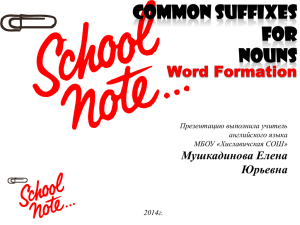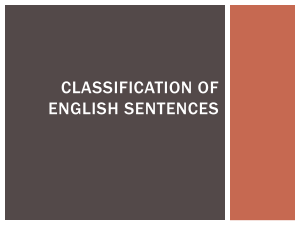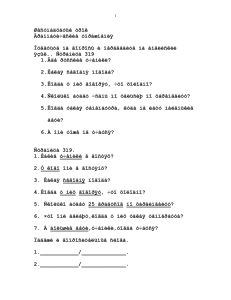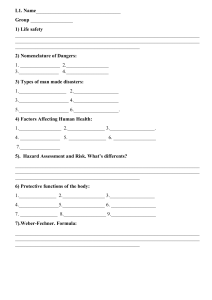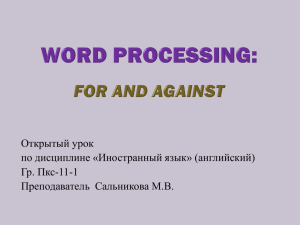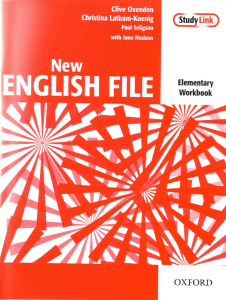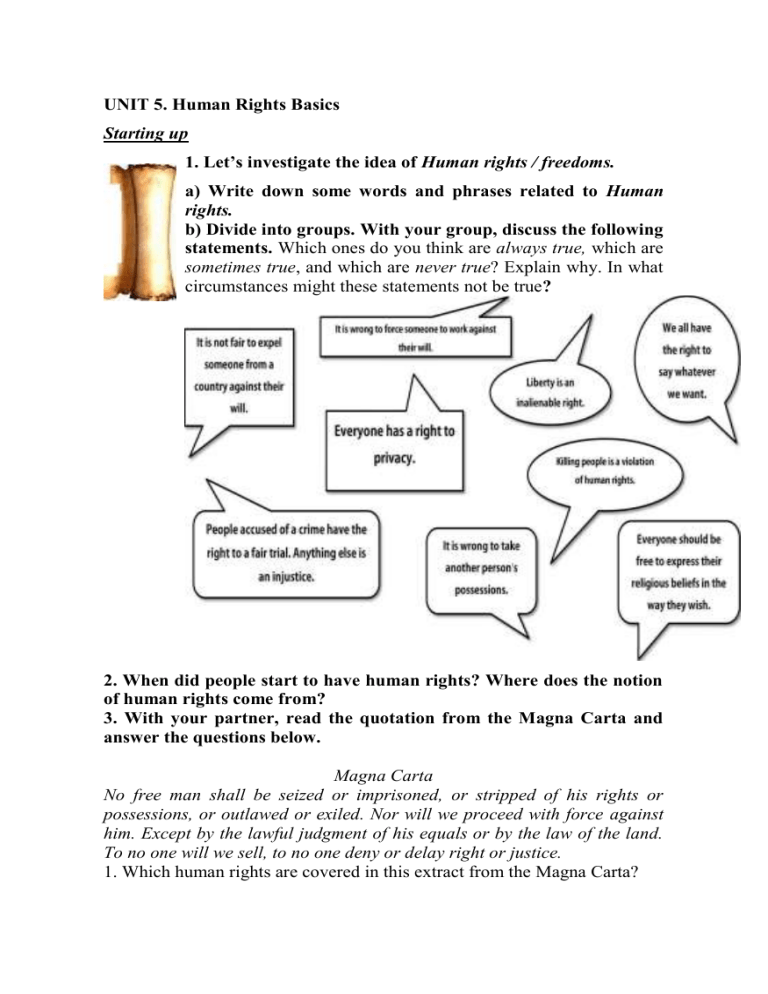
UNIT 5. Human Rights Basics Starting up 1. Let’s investigate the idea of Human rights / freedoms. a) Write down some words and phrases related to Human rights. b) Divide into groups. With your group, discuss the following statements. Which ones do you think are always true, which are sometimes true, and which are never true? Explain why. In what circumstances might these statements not be true? 2. When did people start to have human rights? Where does the notion of human rights come from? 3. With your partner, read the quotation from the Magna Carta and answer the questions below. Magna Carta No free man shall be seized or imprisoned, or stripped of his rights or possessions, or outlawed or exiled. Nor will we proceed with force against him. Except by the lawful judgment of his equals or by the law of the land. To no one will we sell, to no one deny or delay right or justice. 1. Which human rights are covered in this extract from the Magna Carta? 2. Is there a group of people in society who are not mentioned in this document? Who are they? Why is this, do you think? 3. Which other important human rights would you include if you had to write a similar charter? Main part Listening 1. a) In this video, tutor Genevieve White tells you what historic events led tothe adoption ofThe Universal Declaration of Human Rights. b) You are going to watch a speech by the former First Lady Eleanor Roosevelt: Address to the United Nations General Assembly On the Adoption of the Universal Declaration of Human Rights, delivered 9 December 1948 in Paris, France. She lays out the aspirations of the declaration with the hope that it will become the "international Magna Carta". She emphasizes that the declaration is not a binding treaty or law, but rather a moral standard of achievement for all nations concerning basic principles of human rights and freedoms. You might find it helpful to follow the transcript, which you can find in the Appendix. http://www.americanrhetoric.com/speeches/eleanorrooseveltdeclarationhum anrights.htm https://www.youtube.com/watch?v=_6YNIXPGXKo Take notes while watching.Highlight key phrases reflecting the content her speech. Use your notes to write an abstract to the video. Vocabulary Key terms and concepts. 2 Task 1. a) Match the words with their definitions. 1. inalienable a) hearing in court to decide whether someone is guilty or innocent of a crime 2. violate b) being able to keep one’s own personal life a secret 3. injustice c) protect from harm 4. responsibility d) freedom or power to act or think in the way one chooses 5. trial e) destroy or disobey a law or right 6. safeguard f) unfair treatment 7. right to privacy g) duty to act in a particular way 8. liberty h) cannot be removed or taken away b) Use one of the words from the list above to complete the following expressions. 1. Everyone has a _____________ to protect the rights of others. 2. Documents such as the Magna Carta established the notion that we all have _______________ rights, and nobody can take these from us. 3. It is illegal to ______________ someone’s human rights. 4. In some places, there are many examples of ________________, in spite of international human rights legislation. 5. _______________ is one of the most fundamental human rights. 6. The right to a fair _______________ in court and to be judged by one’s peers was established by the Magna Carta. 7. Amnesty International exists to _________________ human rights all over the world. 8. “No person shall be deprived of his life or personal _______________________ except according to a procedure established by law”. Task 2.Match each legal concept (1-27) with its definition (A-AA). 1)race a) the same (adjective) b) the things that you should be 2) political allowed to have (noun) c) a feeling you have that you have 3) slavery done right or wrong (noun) d) to have the right to do or have 4) constitution something (verb) e) difference (noun) 5) detention f) a group of people with distinct 3 physical characteristics or culture (noun) g) referring to government or party politics (adjective) h) having the legal power over someone or something (adjective) i) the act of limiting something (noun) j) the situation of being free (noun) k) the situation of being a person who belongs to someone and works for them without payment (noun) l) the situation of having to work very hard for someone, usually in poor conditions and with very time or no pay (noun) m) the buying and selling of people against their will (noun: 2 words) n) to say that something must not happen (verb) o) hurting someone badly so that they are forced to give information (noun) p) causing fear, anguish and inferiority (adjective) q) the unfair treatment of someone because of their colour, class, religion, language, etc (noun) r) the act of breaking a rule (noun) s) the act of encouraging, persuading or advising someone to do something morally or legally wrong (noun) t) a court, often one which specialises in a particular area of law (noun) u) basic, essential (adjective) v) laws and principles under which a country is governed (noun) w) done at random, without reason (adjective) 6) tribunals 7) violation 8) liberty 9) fundamental 10) equal 11) rights 12) conscience 13) entitled 14) obligations 15) degrading 16) impartial 17) jurisdictional 18) servitude 19) distinction 20) limitation 21) exile 22) torture 23) prohibited 24) slave trade 25) discrimination 4 26) incitement x) the act of keeping someone so that he/she cannot escape or enjoy freedom (noun) y) the punishment of being made to live in another country, or another part of a country (noun) z) not biased or prejudiced (adjective) aa) duty to do something (noun) 27) arbitrary Task 3. Fill in the blanks in the paragraphs below, using the words provided. The Declaration of Human Rights сharge, detention, discrimination, exile, freedoms, law, liberty, punishment, race, remedy, rights, slavery, tribunal, free Article 1 All human beings are born free and equal in dignity and rights. Article 2 Everyone is entitled to all the rights and _________________ set forth in this Declaration, without distinction of any kind, such as _________________, colour, sex, language, religion, political or other opinion, national or social origin, property, birth or other status. Article 3 Everyone has the right to life, ________________ and security of person. Article 4 No one shall be held in __________ or servitude; slavery and the slave and the slave trade shall be prohibited in all their forms. Article 5 No one shall be subjected to torture or to cruel, inhuman or degrading treatment or ____________ . Article 6 Everyone has the right to recognition everywhere as a person before the ________________ . Article 7 All are equal before the law and are entitled without any ________________ to equal protection of the law. Article 8 Everyone has the right to an effective ______________ by the competent national tribunals for acts violating the fundamental rights granted him by the constitution or by law. 5 Article 9 No one shall be subjected to arbitrary arrest, __________________ or ____________ . Article 10 Everyone is entitled in full equality to a fair and public hearing by an independent and impartial _______________, in the determination of his ______________ and obligations and of any criminal ____________ against him. Reading 1. Read the text and do the activities after it. The United Nationsand Human Rights The pursuit of human rights was the central reason for creating the UN, World War II atrocities and genocide led to a ready consensus that the new organization must work to prevent any similar tragedies in the future. An early objective was creating a legal framework for considering and acting on complaints about human rights violations. The UN Charter obliges all member nations to promote “universal respect for, and observance of, “human rights” and to take “joint and separate action” to that end. The Universal Declaration of Human Rights, though not legally binding, was adopted by the General Assembly in 1948. The Assembly regularly takes up human rights issues. The UN and its agencies are implementing the principles enshrined* in the Universal Declaration of Human Rights. A case in point is support by the UN for countries in transition to democracy, technical assistance in providing free and fair elections, improving judicial structures, drafting constitutions, training human rights officials. The UN has helped run elections in countries with little democratic history, including Afghanistan and East Timor. The UN is also a forum to support the right of women to 6 participate fully in the political, economic, and social life of their countries. The UN contributes to raising consciousness of the concept of human rights through its covenants* and its attention to specific abuses through its General Assembly, Security Council resolutions, or International Court of Justice rulings. The purpose of the United Nations Human Rights Council, established in 2006, is to address human rights violations. The Council is the successor to the United Nations Commission on Human Rights, which was often criticised for the high-profile positions it gave to member states that did not guarantee the human rights of their own citizens. The council has 47 members distributed by region, each serve a three year term, and may not serve three consecutive* terms. A candidate to the body must be approved by a majority of the General Assembly. The rights of some 370 million indigenous* peoples around the world is also a focus for the UN, with the Declaration on the Rights of Indigenous Peoples being approved by the General Assembly in 2007. The declaration outlines the individual and collective rights to culture, language, education, identity, employment and health, thereby addressing post-colonial issues which have confronted indigenous peoples for centuries. The declaration aims to maintain, strengthen and encourage the growth of indigenous institutions, cultures and traditions. It also prohibits discrimination against indigenous peoples and promotes their active participation in matters which concern their past, present and future. In conjunction with other organizations such as the Red Cross, the UN provides food, drinking water, shelter and other humanitarian services to populaces suffering from famine*, displaced by war, or afflicted by other disasters. Major humanitarian branches of the UN are World Food Programme (which helps feed more than 100 million people a year in 80 countries), the office of the High Commissioner for Refugees*with projects in over 116 countries, as well as peacekeeping projects in over 24 countries. Glossary enshrine –toenclose in,to preserve or cherish as sacred covenant –a usually formal, solemn, and binding agreement consecutive–following one after another in a series, without interruption indigenous –produced, growing, living, or occurring naturally in a particular region or environment famine –an extreme scarcity of food,a great shortage of food 7 refugee –one that flees; especially: a person who flees to a foreign country or power to escape danger or persecution Task 1.Answer the questions. 1. What was the central reason for creating the UN? 2. When was the Universal Declaration of Human rights adopted? 3. What principles enshrined in the Declaration are being implemented by the UN and its agencies? 4. What is the purpose of the United Nations Human Rights Council? 5. What does the Declaration on the Rights of Indigenous Peoples outline? 6. What does the Declaration on the Rights of Indigenous Peoples prohibit? Task 2.Do the following statements agree with the information? Write YES if the statement agrees with the information. Write NO if the statement contradicts the information. Make these statements correct. 1. The Universal Declaration of Human Rights was adopted by the Security Council in 1945. 2. The UN Charter obliges all member nations to promote respect for and observance of human rights. 3. The UN does not support the rights of women. 4. The UN Human Rights Council was established in 2000. 5. The UN Commission on Human Rights was criticized for not taking up human rights issues regularly. 6. The Declaration of Human Rights of Indigenous Peoples does not promote the active participation in matters which concern their life 2.Read Articles 11-20 of the Declaration of Human Rights below. Highlight a key phrase reflecting the content of each article. Article 11 (1) Everyone charged with a penal offence has the right to be presumed innocent until proved guilty according to law in a public trial at which he/she has had all the guarantees necessary for his/her defence. (2) No one shall be held guilty of any penal offence on account of any act or omission which did not constitute a penal offence, under national or international law, at the time when it was committed. Nor shall a heavier penalty be imposed than the one that was applicable at the time the penal offence was committed. 8 Article 12 No one shall be subjected to arbitrary interference with his/her privacy, family home or correspondence, nor to attacks upon his/her honour and reputation. Everyone has the right to the protection of the law against such interference or attacks. Article 13 (1) Everyone has the right to freedom of movement and residence within the borders of each state. (2) Everyone has the right to leave any country, including his/her own, and to return to his/her country. Article 14 (1) Everyone has the right to seek and to enjoy in other countries asylum from persecution. (2) This right may not be invoked in the case of prosecutions genuinely arising from non-political crimes or from acts contrary to the purposes and principles of the United Nations. Article 15 (1) Everyone has the right to a nationality. (2) No one shall be arbitrary deprived of his/her nationality nor denied the right to charge his/her nationality. Article 16 (1) Men and women of full age, without any limitation due to race, nationality or religion, have the right to marry and to found a family. They are entitled to equal rights as to marriage, and at its dissolution. (2) Marriage shall be entered into only with the free and full consent of the intending spouses. (3) The family is the natural and fundamental group unit of society and is entitled to protection by society and state. Article 17 (1) Everyone has the right to own property alone, as well as in association with others. (2) No one shall be arbitrarily deprived of his/her property. Article 18 Everyone has the right to freedom of thought, conscience and religion: this right includes freedom to change his/her religion or belief, and freedom, either alone or in community with others and in public or private, to 9 manifest his/her religion or belief in teaching, practice, worship and observance. Article 19 Everyone has the right to freedom of opinion and expression, this right includes freedom to hold opinions interference and to seek, receive and impart information and ideas through any media and regardless of frontiers. Article 20 (1) Everyone has the right to freedom of peaceful assembly and association. (2) No one shall be compelled to belong to an association. 3.Read Articles 21-30 of the Declaration of Human Rights below. The right column gives a brief summary of these articles. Find their full version in the left column. Freedom from Article 21 Everyone has the right to take part in their interference in all of country’s political affairs either by belonging to the the above rights. government themselves or by choosing politicians who have the same ideas as them. Elections should Right to desirable take place regularly and voting should be a secret. work and to join Every adult should have the right to vote and all trade unions. votes should be equal. Right to rest and Article 22 The society in which you live should help you to leisure. develop and to make the most of all the advantages (culture, work, social welfare) which are offered to Right to adequate you. living standards. Article 23 Every adult has the right to a job, and to receive a Right to social salary that can support him/her and his/her family. security. Men and women should get paid the same amount of money for doing the same job. Anyone can join Duty to preserve a trade union. other people’s rights and freedoms. Article 24 Everyone should have the right to rest from work and to take regular paid holidays. Right to education. Article 25 Everyone has the right to a good life, with enough Free elections and the food, clothing, housing and healthcare. You should right to participate in be helped if you are out of work, if you are ill, if government you are old or if your husband or wife is dead. Women who are going to have a baby should Right to participate in 10 receive special help. All children should have the same rights, whether their mother is married or unmarried. Article 26 Everyone has the right to go to school and should go to school. Primary schooling should be free. Everyone should be able to learn a profession or continue their studies as far as people. Every-one others from different races and backgrounds. Parents should have the right to choose how and what their children lean. Article 27 Everyone should have the right to share in their community`s arts and sciences. Works by artists, writers or scientists, should be protected benefit from them. Article 28 There should be an order to protect your rights. It should be both local and worldwide Article 29 Everyone should have duties to other people. Human rights should be observed and protected by everyone in a spirit of mutual respect Article 30 Nobody should take away these rights and freedoms from us the cultural life of the community. Right to peace and other. 4. Read the textand match the information to the following headings. You will need to use some of the headings more than once. The International Court of Justice The International Court of Justice is the principal judicial body of the United Nations. Its seat is in The Hague (Netherlands). It began work in 1946, when it replaced the Permanent Court of International Justice which had functioned in The Hague since 1922. Below is some information about the court and its activities. • Functions of the Court • Composition • The Parties in Cases between States • Jurisdiction in Cases between States 11 • • • Procedure in Cases between States Sources of Applicable Law Advisory Opinions 12 International Court of Justice Headings One of the roles of the Court is to settle in accordance with international law the legal disputes Functions of the Court submitted to it by States. The Court decides in accordance with international treaties and conventions in force, international custom, the general principles of law and, as subsidiary means, judicial decisions and the teachings of the most highly qualified publicists. The Members of the Court do not represent their governments but are independent magistrates. The advisory procedure of the Court is open solely to international organizations. The Court is competent to entertain a dispute only if the States concerned have accepted its jurisdiction. The other role is to give advisory opinions on legal questions referred to it by duly authorized international organs and agencies. Only States may apply to and appear before the Court. The Court is composed of 15 judges elected to nineyear terms of office by the United Nations General Assembly and Security Council. After the oral proceedings, the Court deliberates in camera and then delivers its judgement at a public sitting. 13 If one of the States involved fails to comply with it, the other party may have recourse to the Security Council of the United Nations. The Court may not include more than one judge of any nationality. The judgement is final and without appeal. Speaking 1. Place the rights below in what you consider to be the correct order, from 1 (most important) to 10 (least important). Be prepared to give reasons for your choices. The right to an education The right to liberty The right to freedom of expression (including freedom of the press) The right to vote The right to privacy The right to choose who to marry — or not to marry The right to a fair trial The right to freedom of movement The right not to be harmed by others, to be safe and secure The right to work Use the following expressions to organize your answer: ……. is of more/less (greater/lesser) importance than …….. …….. is of little/great/fundamental/ paramount importance ……… is fairly (un)important/inconsequential/ trivial/(in)significant/(ir)relevant compared with ……. 2. Read these five clauses from the Declaration of Human Rights. Which one do you think is the most important? - The Right to Equality. We are all born free. We all have our own thoughts and ideas. We should all be treated in the same way. - The Right to Trial. If we are put on trial this should be in public. The people who try us should not let anyone tell them what to do. 14 - The Right to Marriage and Family. Every grown-up has the right to marry and have a family if they want to. Men and women have the same rights when they are married, and when they are separated. - The Right to Freedom of Thought. We all have the right to believe in what we want to believe, to have a religion, or to change it if we want. - The Right to Education. Education is a right. Primary school should be free. We should learn about the United Nations and how to get on with others. Our parents can choose what we learn. © British Council 3. a) Divide into two - three groups. Read the scenario below, identify which rights/freedoms are at risk in this scenario. b) Subdivide into group a) and group b). Debate one side of the scenario, acting as an advocate for the individual. Try to convince the other group that your side of the argument is more important. a Mr Nick O’Teen likes to go to his local bar and have a pint and a few cigarettes with his friends. He doesn’t see why he should be made to stand outside to smoke in winter when it’s cold. Surely he has the freedom to do as he chooses and he can smoke indoors if he likes? b Ms Lily Fragrant is a vehement anti-smoker. She enjoys going to bars, but she hates the smell of tobacco on her clothes and hair, and furthermore, she doesn’t want to breathe in all that nasty smoke - after all, it’s bad for her health as well as everyone else’s. c) Using the information discussed in class and your own ideas answer the following guestions in writing: People have rights, but they also have responsibilities. What responsibilities do we have as citizens? Which are the most important of these, in your view, and why? 4. Why is it important we have a Supreme Court? 15 Cases heard by the highest court in the land: Identifying significant ‘points of law’ Can you work out which specific human rightswere raised as points of law in the following recent cases heard at TheSupreme Court, or its predecessor, the Appellate Committee of the Houseof Lords (“The Law Lords”)? • The right to life • The right not to be tortured or treated in an inhuman or degrading way • The right to be free from slavery or forced labour • The right to liberty • The right to a fair trial • The right to not to be punished except in accordance with law • The right to respect for private and family life, home and correspondence • The right to freedom of thought, conscience and religion • The right to freedom of expression • The right to freedom of assembly and association • The right to marry and found a family • The right not to be discriminated against in relation to any of the rights contained in the European Convention on Human Rights • The right to peaceful enjoyment of possessions • The right to education • The right to free elections • Abolition of the death penalty (abolished in the UK in the 1960s). 1) Naomi Campbell sued The Mirrornewspaper, which had printedphotographs of her withoutpermission, coming out of a drugsrehabilitation centre. Her lawyerstook the case all the way to theAppellate Committee of the House ofLords after The Mirror won its case in the (lower) Court of Appeal. Thenewspaper argued that publishing the story was in the public interest. 16 2) A man from Iran and a man fromCameroon, who were asylumseekers, wished to appeal against thedecision which denied them asylumin the UK. They appealed on thegrounds that they were bothhomosexual and would facepersecution in their home countries if sent back to their home countries.Iran imposes the death penalty for homosexual practices and Cameroonpunishes such practices with imprisonment. 3) A student took her case to the AppellateCommittee of the House of Lords as shewas denied the right to attend her schoolwearing a religious form of clothingknown as a Jilbab. She wished to wear thisform of clothing because she found theschool uniform was too revealing andtherefore went against her religious beliefs. 4) The ‘Countryside Alliance’, a pro-hunting group, wanted to challenge thelegality of the Hunting Bill 2005which sought to outlaw huntingwith dogs (particularly fox hunting,but also the hunting of deer, haresand mink and organised harecoursing) in England and Wales 17 3.Name the Articles oftheDeclarationofHumanRightsthathavebeenbroken in the cases given below. 1. Children between the age of 5 and 11 have to go to school, but their parents must pay for it. 2. A man has his house broken into and his television stolen. He goes to the police but they tell him to go away because they have more important things to do. 3. Archie White, a magistrate, has his car stolen. The police arrest and charge the man they think is responsible. The next day the man is taken to court for an initial hearing. The chairman of the justices (the head magistrate) in the courtroom is Archie White. He tells the members of the public that they have to leave the courtroom. 4. Staff employed by Kaput Computers have to start work at 7 in the morning and work until 7 in the evening, with only a half hour break for lunch. They work from Monday to Saturday, and do not get paid leave. 5. A couple wants to have a baby. The government says that the country is overpopulated and tells them that they cannot have a baby yet. 6. A new government tells all public servants that they have to become a member of their political party. Anyone who refuse will lose their job. 7. John Doe is arrested because the police think he has killed someone. Before his trial has begun, a popular newspaper publishes an article about him (complete with photographs of his arrest) with the headline “Vicious murderer John Doe caught!” 8. Two friends, one white and one black, have been threatened with violence. They go to the police to ask for protection. The police agree to help the white man, but not the black man. 9. A journalist writes a newspaper article explaining why he opposes his country`s foreign policy. He is told by the government that he has become persona non-grata, he must leave the country immediately and never return. 18 10. A woman who lives in a capital city wants to visit her sick father, who lives 200 km away. She is told that she cannot leave the city to visit him. 11. A poor man murders someone and is sent to prison. A rich man commits a murder in similar circumstances but is allowed to go free. 12. A robber is sent to prison for 5 years. While he is in prison, the government confiscates all his belongings, and then destroys his house. 13. A man travels to another country where he asks to stay because he is frightened of remaining in his home country. He is immediately sent back to the country he came from. 14. The Republic of Istanata has never given women the right to vote. 15. At a party, a woman tells a group of friends that she thinks the government of her country is corrupt and incompetent. The next day she is arrested and never seen again. 16. A newspaper editor dislikes a famous popular actress, he publishes an article about her. The article describes the actress as ‘ugly, stupid and unable to act.’ 17. A group of about 200 people hold a meeting in a public building to discuss their government’s policies. The police arrive and arrest them all. 18. The government intercepts, opens and reads one of their key opponent’s letters and other mail. 19. A famous political author writes a book criticizing the police. She then leaves her home to go on a tour to promote her book. While she is away, the police start harassing her husband and children. 20. A husband and wife get divorced. The law in their country says that in any divorce case the man automatically gets custody of the children. 21. A woman joins a trade union. The company she works for discovers this and immediately dismisses her. 22. A man loses his job and cannot find work. His country does not offer financial support for people who are out of work. 23. A 17-year-old boy murders someone a few days before his 18th birthday. He is arrested, and six months later the case goes to court. His country has the death penalty for murder if the murderer is 18 or over. The judge sentences him to death and he is executed. 24. A policeman does not like the look of a young man sitting on a park bench, so arrests him, takes him to the police station and puts him in a police cell. 25. The police suspect that a man is a member of a terrorist organization. They hit him, deprive him of food, water and sleep, and burn him with cigarettes until he confesses. 19 26. A poor man borrows money from a wealthy factory owner. He is unable to pay the money back. The factory owner takes the man’s 12 year-old son and makes him work in the factory to pay off the debt. 27. A new government closes all the churches, temples, mosques and synagogues in its country, and forbids anyone from attending services there. 28. A family want to take a holiday abroad, and apply for passports. They are told that they cannot have passports and cannot go abroad. 29. Mr. Smith and Ms Jones do exactly the same job for the same company. They have the same qualifications and the same experience. Mr. Smith receives $35000 a year, and Ms. Jones receives $28000 a year. 4. Look throughthe UK Supreme Court Annual Report 2017–2018. Section three Performance report: Jurisdiction and casework. Cases and judgements https://www.supremecourt.uk/docs/annual-report-2017-18.pdf Although every appeal heard by the UKSC is of importance, many also attract considerable public interest owing to their impact on wider society or legal interest because of the scope of the precedent set. Choose one out of the most prominent cases determined by the Court and write down a summaryof the case. For example, you might find it interesting to get to know about the case “Walker v Innospec Limited and others [2017] UKSC 47”. An important case on discrimination on grounds of sexual orientation held that the current law, which in respect of employees in civil partnerships denied pension benefits accruing before 2005, when civil partnerships were introduced, was contrary to European Union law and must therefore be disapplied. Mr Walker had worked for Innospec from 1980 until his retirement in 2003. He had lived with his male partner since 1993. They entered into a civil partnership in 2006 and are now married, but Innospec refused to confrm that in the event of his death, it would pay the spouse’s pension under the scheme to his civil partner. The domestic law of the UK, now found in the Equality Act 2010, had not properly transposed the prohibition ondiscrimination in the relevant EU Directive. EU law did not impose a requirement on member states to recognise same-sex marriages but, if a status equivalent to marriage was available under national law, an employer must treat both equally. Unless there would be unacceptable economic or social consequences of giving effect to Mr Walker’s entitlement to a survivor’s pension for his husband at the time this pension would fall due, there was no reason why he should be 20 subjected to unequal treatment as to the payment of that pension, calculated on the basis of all his years of service with Innospec. 21
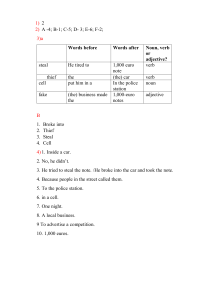
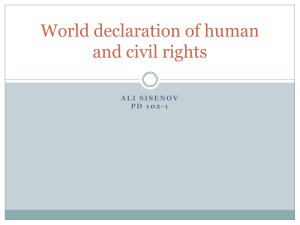
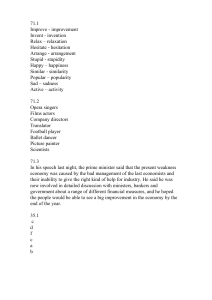
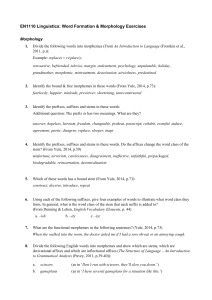
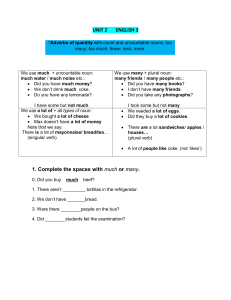
![[N[N]] - University of Oregon](http://s1.studylib.ru/store/data/005078930_1-91d3a60c2ee74894ae2e474f46cc8471-300x300.png)
